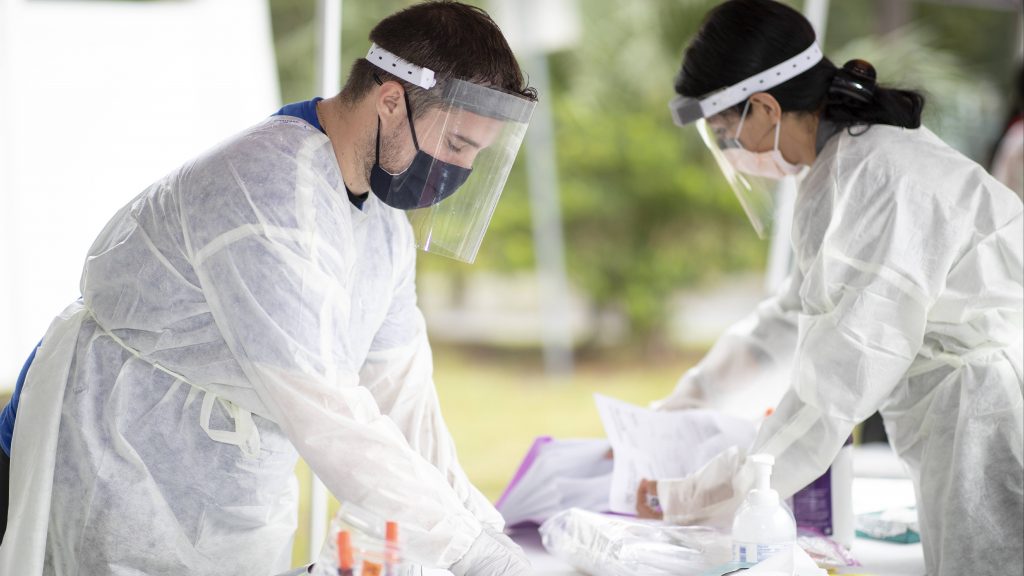
The emergence of new COVID-19 variants has raised many questions about how they may affect the pandemic. Dr. Matthew Binnicker, the director of the Clinical Virology Laboratory at Mayo Clinic and leader of a team that developed a COVID-19 test, answers some of these questions.
Journalists: Broadcast-quality sound bites with Dr. Binnicker are available in the downloads. Please courtesy, "Matthew Binnicker, Ph.D./Laboratory Medicine and Pathology/Mayo Clinic."
In this Q&A, Dr. Binnicker explains how emerging variants could affect COVID-19 testing, vaccines and spread:
What is a variant, and were these COVID-19 variants expected?
A variant basically means a mutation that occurs in the virus over time. Ever since we first learned about SARS-CoV-2, the disease that causes COVID-19, we knew that mutations or variations in its genome would occur over time. That's because it has a certain type of genome, called an RNA genome, that is more prone to undergoing changes or mutations.
As with natural evolution, as the virus infects people, it has the opportunity to replicate its genome. Every time it replicates its genome, there are chances for errors or mutations to occur. So we've now been with this virus for a year, and as its infected millions of people, it's replicated its genome billions of times. And errors have been incorporated. These have resulted in mutations or variants.
What are the main concerns with the new COVID-19 variants?
The three main concerns with any viral variant are, first: Does it spread easier? In other words, are we going to start seeing more cases because the virus has basically gained an ability to be transmitted from one person to another more efficiently? The second concern is: Does the variation or the mutation in the virus cause it to be more severe in terms of disease, or cause higher rates of death? And then the third thing that we're always worried about is: What are its effects on vaccination and potentially therapeutics? So as the virus changes over time, does the efficacy of vaccines decline? Are therapies that we have available today less effective against treating the infection when these variants become more prominent?
Will current COVID-19 vaccines protect people from the variant strains?
I think that it's safe to say for currently circulating variants of SARS-CoV-2 that the vaccines will offer some level of protection against those strains. Now where that efficacy falls on a continuum, I think we're still learning that.
It appears that the Pfizer-BioNTech and Moderna vaccines, which are being distributed in the U.S., will offer strong protection against the U.K. variant. With the South African variant, there's some evidence showing that the efficacy may be reduced.
Now when we talk about reduced efficacy, it's not going from 95% efficacy to zero. It might be a reduction from 95% to 85% efficacy against preventing severe COVID-19 disease.
I think it's really important to stress the immune response that's generated in response to a vaccine is really complex, and there are a number of different angles as to how the immune response can fight these infections. If we see one part of the immune response be less effective due to a variant, there are typically other angles that the immune response can use to help fight off the infection.
Do COVID-19 tests detect these new variants?
The majority of tests that are being used in the U.S. look for at least two, sometimes three, different parts of the viral genome. So if there are mutations in one gene, there's still a backup in the test to detect that variant.
I'm confident that testing for SARS-CoV-2, which is most commonly accomplished by PCR (polymerase chain reaction) testing, is going to be able to detect these variant strains. However, we're continuing to sequence these viruses, and we're going to have to make updates to the tests to ensure that long term they're still effective.
Can anything be done to prevent the emergence of new variant strains?
Viruses can't mutate if they don't replicate. So we need to prevent viruses like SARS-CoV-2 from having the opportunity to replicate, which means we need to prevent them from infecting people.
The best way that we can accomplish that goal is to take the precautionary measures that we've been using for the last year. Masking is effective, as is keeping physical distance from one another, especially when we're indoors and in confined spaces.
Finally, getting vaccinated is probably the most important measure that we can take. Even though someone who gets vaccinated could still be infected with the virus, it's very likely that they're not going to have as much virus in their system as an unvaccinated person, so they're going to be much less likely to be able to transmit that virus to other people.
All of those steps ― vaccination, masking and physical distancing ― are going to be really important to help drive down the number of infections, and that will slow the emergence of new variants.
___________________________________________
For the safety of its patients, staff and visitors, Mayo Clinic has strict masking policies in place. Anyone shown without a mask was either recorded prior to COVID-19 or recorded in a nonpatient care area where social distancing and other safety protocols were followed.
Information in this post was accurate at the time of its posting. Due to the fluid nature of the COVID-19 pandemic, scientific understanding, along with guidelines and recommendations, may have changed since the original publication date.
For more information and all your COVID-19 coverage, go to the Mayo Clinic News Network and mayoclinic.org.
Learn more about: tracking COVID-19 and COVID-19 trends.








